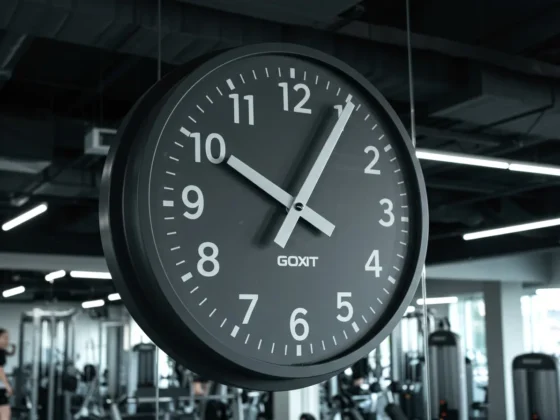Alright Fit Fellows, let’s talk about the engine driving the machine – the mind. We spend hours sculpting the physique, pushing iron, hitting the pavement, chasing down goals with sweat and grit. But how much time do we invest in forging the inner steel? The truth is, true strength isn’t just measured in pounds lifted or miles run; it’s built in the quiet moments, in the face of frustration, in the discipline to keep going when every fiber screams surrender. Building mental strength isn’t some abstract concept; it’s a vital part of peak performance, in the gym and in life. It’s about cultivating resilience, managing the relentless current of daily demands, and ensuring the mind is as sharp and capable as the body. Think of it as training the ultimate muscle – the one between your ears. Let’s dive into how we can fortify this inner fortress.
Life, with its endless to-do lists, unexpected curveballs, and the constant hum of responsibility, can sometimes feel like a relentless tide pulling you under. Stress isn’t just an emotional state; it’s a physical drain, chipping away at your energy, focus, and even hindering physical recovery. Learning to navigate this landscape effectively is like mastering a vital skill for survival in the modern world. It’s about recognizing the signs early – that persistent tension in your shoulders, the shorter fuse, the feeling of being constantly “on” – and having a toolkit ready to push back against the rising water before it swamps you completely. Simple practices, like stepping away for five minutes to breathe deeply, getting outside for a quick walk, or even just consciously unclamping your jaw, can create crucial pockets of calm.
Consider stress management not as a luxury, but as essential maintenance for high-performance living. It’s about setting boundaries, learning to say no when necessary, and scheduling genuine downtime just as diligently as you schedule your workouts. Embracing activities that recharge your batteries, whether it’s reading, spending time in nature, or connecting with friends and family, provides ballast against the storms. By actively managing stress, you’re not only protecting your mental well-being but also preserving the energy needed to stay consistent with your fitness goals and transition smoothly into maximizing your recovery.
Now, speaking of recovery, let’s talk about one of the most overlooked, yet profoundly powerful, tools in our arsenal: sleep. We push hard, break down muscle fibers, tax our nervous systems, and the magic truly happens when we’re unconscious. Quality sleep isn’t just about feeling rested; it’s the bedrock upon which physical repair, hormonal balance, and cognitive function are built. Skimping on sleep is like trying to build a skyscraper on shaky ground – eventually, things are going to crack. It impairs judgment, slows reaction times, increases injury risk, and dulls that mental edge you need to perform at your best, both in the gym and when tackling complex problems during the day.
Optimizing your sleep environment and habits can feel like uncovering a hidden cheat code for life. This means aiming for consistent sleep and wake times, even on weekends, creating a cool, dark, and quiet bedroom sanctuary, and developing a relaxing pre-sleep ritual to signal to your body that it’s time to wind down. Avoiding screens right before bed, limiting caffeine and alcohol, and getting some natural light exposure during the day all contribute to a healthier sleep cycle. Prioritizing those crucial hours each night isn’t just about feeling less tired; it’s a direct investment in your physical prowess, your mental clarity, and your ability to stay sharp and receptive to new information, particularly when it comes to sharpening your mind.
With stress managed and sleep optimized, you’ve laid a fertile ground for cultivating a truly sharp mind. This is where practices like mindfulness and positive thinking come into play, not as airy-fairy concepts, but as practical techniques for gaining control over your internal dialogue and focusing your mental energy. Mindfulness, at its core, is simply paying attention – being present in the moment without judgment. It’s noticing the feel of the bar in your hands, the rhythm of your breath during a run, or the taste of your meal, rather than letting your thoughts drift endlessly into past regrets or future anxieties. This deliberate practice builds your capacity to focus, reduces mental clutter, and helps you respond to challenges rather than just reacting impulsively.
Coupled with mindfulness, cultivating a positive mindset acts like a mental filter, helping you see opportunities where others see obstacles. This doesn’t mean ignoring reality or pretending everything is perfect; it’s about consciously choosing to focus on solutions, learning from setbacks, and appreciating progress, no matter how small. Affirmations, gratitude practices, and reframing negative thoughts aren’t just feel-good exercises; they are active ways to rewire your brain for resilience and optimism. By intentionally training your mind to dwell on the positive and stay anchored in the present, you build the mental fortitude needed to face adversity head-on and transition into developing unshakeable resilience.
Life has a funny way of throwing curveballs when you least expect them. Injuries happen, plans fall apart, and setbacks are an inevitable part of the journey, in fitness and beyond. Developing unshakeable resilience isn’t about avoiding difficulty; it’s about building the capacity to bounce back, stronger and wiser, after you’ve been knocked down. It’s the mental toughness that allows you to view challenges not as endpoints, but as temporary detours or opportunities for growth. This inner grit is forged in the fires of experience, but it’s also something you can actively cultivate through conscious effort.
Resilience is built brick by brick. It involves developing a strong sense of self-belief, understanding that you are capable of handling difficulty, and drawing upon past successes, no matter how minor. It’s about building a support network of friends and mentors who lift you up and offer perspective. It’s also about learning from failure – dissecting what went wrong, extracting the lessons, and applying them moving forward without getting trapped in self-recrimination. By embracing challenges as part of the process and actively working through them with a growth mindset, you build a core of resilience that will serve you well in every aspect of your life.
Conclusion: The Inner Forge
So there you have it, fellows. While we’re rightly focused on building powerful bodies, let us never forget the critical importance of forging an equally powerful mind. Managing stress, optimizing sleep, sharpening your focus, and developing resilience aren’t just add-ons to your fitness journey; they are fundamental pillars that support and enhance every physical gain you make. The work you put in on the inside directly amplifies your results on the outside. Keep pushing your limits, both physically and mentally, for true strength is a harmonious blend of both. This continuous process of challenging yourself, adapting, and growing is the essence of the journey, and the rewards extend far beyond the gym. Keep training that inner athlete; the returns are immeasurable.




















